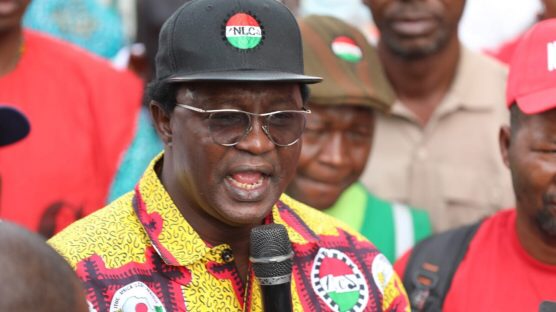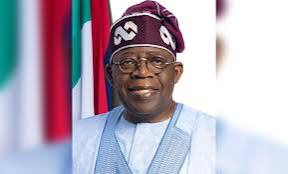2023: Labour Charges Workers Not To Waste ‘Torch Of Hope’

President, Nigeria Labour Congress (NLC) Ayuba Waba. PHOTO/FACEBOOK/NLCHQ
Last year was, no doubt, a very difficult year for Nigerian workers, just as it was elsewhere across the world. The year was characterised by challenges such as, elevated inflation, prolonged strikes by the Academic Staff Union of Universities (ASUU) and increased oil prices due to the Russia/Ukraine war among others that affected households and weakened workers’ purchasing power.
The year was described by most Nigerians as one of the worst, as it pushed many into poverty, with about 133 million people becoming poorer. Many low-income households continued to struggle to keep pace with the rising cost of living, coupled with the soaring unemployment and underemployment.
Even as the Federal Government begins to plan salary increases for civil servants, the N30,000 minimum wage, which has not been implemented by many state governments, became insufficient to keep many households running. Most workers even lost the equivalent of their salaries due to rising inflation.
The Guardian gathered that the cost of living has put further pressure on the financial well-being of employees, as workers earning within the N30,000 minimum wage range resorted to doing menial jobs after work to augment their allowances and meet up with basic needs.
Most of them after the close of work engage in riding tricycle, and point of sale (POS) services, while some at weekends engage in catering and laundry services, among others, to augment their income to take care of their families.
Even as most employers and organisations put measures in place to help employees navigate increasing cost of living and become employers of choice in the post-COVID-19 pandemic world of work, the issue of financial stress affected many employees, which took a toll on their mental health and work-life balance.
Some workers in the public sector have not been paid many months salaries and allowances, forcing them to take on side jobs that are unrelated to their skills and education.
For an impactful 2023, labour leaders and other critical stakeholders are of the view that the year should be one of hope for workers, which should not go dim despite all the challenges they went through in 2022.
The Nigeria Labour Congress (NLC) has described 2023, as beckoning hope for workers, which must not be wasted, especially as the election season approaches.
The labour centre said it has turned up a flicker of light in directing the political energy of Nigeria’s working class and ordinary people by developing a Nigerian Workers’ Charter of Demands.
The charter of demands, NLC said, speaks to the key issues that agitate the mind of the average worker and citizen. President of the NLC, Ayuba Wabba, said the charter of demands, seeks answers to the question of stunted national socio-economic growth as represented by the continued underdevelopment of the nation’s human and natural resources.
He said the charter of demands has identified poor salaries, abysmal working conditions and horrendous living realities as a major clog in the wheel of optimum national development.
He said it identified that dearth of adequate education, healthcare facilities and poor motivation of workers continue to blight every effort at human capital development, thus, increasing non-inclusive growth.
Wabba said the charter also identified the nonchalant attitude of government to value addition to Nigeria’s mineral resources as a major source of widespread unemployment, poverty and destitution in the country.
According to him, of particular concern to labour is the criminal neglect of Nigeria’s public refineries, which are all, operating at near zero capacity.
This, according to him, is truly shameful for the sixth-largest producer of crude oil in the world and the largest exporter of crude oil in Africa. He said it was truly unfortunate that the money government claims to spend on subsidising refined petroleum products imported into Nigeria could rehabilitate the nation’s refineries and build new ones.
“The same culture of indifference to value addition is palpable in our agriculture sector where most of our cash crops and farm produce are shipped overseas in their very raw form and at dirt cheap prices. These products are later processed and imported as semi-finished or finished goods at huge prices. This is how our country has embraced the darkness of being a net exporter of jobs and a net importer of unemployment.
“The Nigerian Workers Charter of Demands raises an eyebrow on our public infrastructure. When will Nigerians enjoy uninterrupted electricity? When will Nigerians be able to travel on roads free from killer potholes, craters, and gullies? When will Nigerians transverse their country on standard railways without losing sleep on being mobbed and snatched by terrorists?
“We urge Nigerians to rise to the challenge using the 2023 general poll as an enabling platform to elect a political leadership that is conscientious, prudent, and completely obedient to our demands as a people. 2023 is our torch of hope! This torch must not be wasted,” he said.
He lamented that many Nigerian workers and ordinary people were currently going through the dark tunnel of soaring inflation, marked by very steep increases in prices of essential goods and services; adding that they were going through a dark tunnel of general apprehension about their security and personal safety as criminals and terrorists hold sway in many parts of the country looting, raping, kidnapping and killing.
Despite the numerous challenges witnessed in 2022, he expressed hope that Nigeria’s brightest morning was just ahead in the New Year, especially with the 2023 general elections.
According to him, there is no bigger harbinger of hope than the opportunity to select a fresh set of political leaders. Noting that political leadership is the match that lights the torch of hope, the NLC chief said every country would rise and fall with its choice of political leadership, stressing that Nigeria was no exception.
He urged workers to be very deliberate in their engagement with the political process, adding that elections are the time to ask critical questions and make rational choices.
“Workers must identify with political party candidates who demonstrate commitment to lighting up the end of the tunnels of economic downturns marked by soaring inflation, widespread insecurity, deepening poverty, escalating crises of unemployment especially among the youth demography of our country, decadent physical infrastructure, and brazen corruption in high places,” he said.
President of the Trade Union Congress of Nigeria (TUC), Festus Osifo, who noted that the year 2022 was the most difficult year for Nigerian workers, said government’s promise to lift millions of citizens out of poverty instead made 133 million Nigerians multi-dimensionally poor.
He described it as the year that the price of staple food tripled, unemployment soared to an all-time high, real wages plummeted, insecurity became ridiculously alarming, the misery index skyrocketed and life became much more unbearable.
Osifo, who is the National President of the Petroleum and Natural Gas Senior Staff Association of Nigeria (PENGASSAN), however, said the hope is not damped as the masses have a unique opportunity to turn things around in 2023 through the power of their vote.
He said: “We cannot continue with these numerous motions with movements. We cannot continue with the incoherence of fiscal and monetary policies, we cannot continue with these rhetorics and excuses. A better future is assured when we vote for competent and capacity-filled leaders across the board in this year’s general elections.
“I urge Nigerian workers and indeed Nigerian citizens to keep hope alive as a better country is possible.” Making projections for the New Year, a Public Affairs Analyst, Jide Ojo, said with the change of government across the spectrum, how the leaders take off will determine how the year will end for workers. He said some governors will use their traditional stance of ‘I met an empty treasury’ to delay payments of salaries.
However, he said the projection would be great if the country has prudent managers of resources, stating that it may be a better year for Nigerian workers.
Stating that even as the Federal Government has put plans to have workers’ salaries increased, he considered: “Even if there is an increase, how many states will be able to pay? Federal Government is more like borrowing to pay salaries and other emoluments. If we can expand our economic base and win it off the dependence on oil and gas if we can diversify, we will have a better year for workers, but if we continue to depend on the volatile oil and gas sector to run our budget and economy, I’m afraid to say 2023 may be worse than 2022.
“Already, look at how much the country has lost to oil theft in 2022. Even though all the frontline candidates said they would do away with subsidy in 2023, it will increase the cost of living, because by the time you start buying fuel officially at over N300 per litre it will lead to inflation in other commodity prices and services. That means the disposable income of workers will be affected negatively because the purchasing power of naira as it is today is highly devalued and weakened.”
He added that if the economy was stable, it would reduce insecurity, reduce poverty and unemployment “because all these are interwoven,” he said.
Source: guardian.ng





